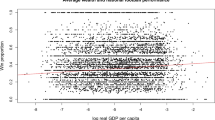Abstract
Since the Japanese National Baseball team won the inaugural World Baseball Classic, “small ball” has been accepted, at least by the media, as a mainstream form of baseball management in Korea. Small ball refers to a manager’s active intervention or strategy implementation in baseball games. In general, the frequency of managers’ orders for play actions such as a sacrifice bunt is higher in Asian baseball than in North American baseball. This paper attempts to statistically test the hypothesis that small ball is effective in winning games by using data from Korean baseball. The panel data analysis of a stochastic production frontier model presents somewhat mixed empirical results, but the overall evidence suggests that small ball actually has detrimental effects on the number of runs scored.
Similar content being viewed by others
Notes
See Fox (2006) for more details.
More background on small ball can be found in sabermetrics materials. For example, see Fox (2005).
The derivation of the conditional expectation is found in Battese and Coelli (1993).
In fact, more possible outcomes exist for a bunt attempt when a runner is on 1st base with no outs: (1) runners on 1st and 2nd bases with no outs if a bunt turns out to be a hit single, and (2) no runners on base with two outs if a bunt ends up in a double play. However, we ignore these cases in our calculations since their chances are slim.
References
Battese G, Coelli T (1993) A stochastic frontier production function incorporating a model for technical inefficiency effects. Working Papers on Econometrics and Applied Statistics
Battese G, Coelli T (1995) A model for technical inefficiency effects in a stochastic frontier production function for panel data. Empir Econ 20:325–332
Berri SM (2000) A statistician reads the sports pages: modeling offensive ability in baseball. Chance 13(4):56–60
Cook E (1966) Percentage baseball. MIT press, Cambridge
Cover TM, Keilers CW (1977) An offensive earned-run average for baseball. Oper Res 25(5):729–740
Dawson P, Dobson S, Gerrard B (2000a) Stochastic frontiers and the temporal structure of managerial efficiency in English soccer. J Sports Econ 1:341–362
Dawson P, Dobson S, Gerrard B (2000b) Estimating coaching efficiency in professional team sports: evidence from English Association Football. Scott J Polit Econ 47:399–421
Fizel JL, Ditri MP (1997) Managerial efficiency, managerial succession and organizational performance. Manag Decis Econ 18:295–308
Fort R, Lee YH, Berri D (2008) Race, technical efficiency, and retention: the case of NBA coaches. Int J Sport Finance 3:84–97
Fox D (2005) Not so sweet surrender. http://www.hardballtimes.com/main/article/not-so-sweet-surrender/. Accessed January 2009
Fox D (2006) Whitney Ball. http://www.hardballtimes.com/main/article/whitey-ball/. Accessed January 2009
Hakes JK, Sauer RD (2006) An economic evaluation of the Moneyball hypothesis. J Econ Perspect 20(3):173–185
Hofler RA, Payne JE (1997) Measuring efficiency in the National Basketball Association. Econ Lett 55:293–299
Kahane LH (2003) Production efficiency and discriminating hiring practices in the National Hockey League: a stochastic frontier approach. Rev Ind Organ 27:47–71
Katsunori A (2001) Modified offensive earned-run average with steal effect for baseball. Appl Math Comput 120:279–288
Korean Baseball Organization, Korean Official Baseball Guide, Seoul, 1996-2008. [In Korean]
Lee YH (2006) Team sports efficiency estimation and stochastic frontier models. In: Fizel J (ed) The handbook of sports economics research. M.E. Sharpe, Inc., Armonk
Lee YH, Berri DJ (2008) A re-examination of production functions and efficiency estimates for the National Basketball Association. Scott J Polit Econ 55:51–66
Lewis M (2003) Moneyball: the art of winning an unfair game. W. W. Norton & Company, New York
Lindsey GR (1963) An investigation of strategies in baseball. Oper Res 11:477–501
McGoldrick KM, Voeks L (2005) “We got game!” an analysis of win/loss probability and efficiency differences between the NBA and WNBA. J Sports Econ 6(1):5–23
Park DW (2008) Disutility of bunts. http://news.naver.com/main. Accessed May 2008 [In Korean]
Ruggiero J, Hadley L, Ruggiero G, Knowles S (1997) A note on the pythagorean theorem of baseball production. Manag Decis Econ 18:335–342
Sauer RD, Waller JK, Hakes JK (2005) The progress of the betting in a baseball game. Presented at Western Economic Association Meetings
Scully GW (1974) Pay and performance in major league baseball. Am Econ Rev 64:915–930
Turocy TL (2005) Offensive performance, omitted variables and the value of speed in baseball. Econ Lett 89:283–286
Zak TA, Huang CJ, Siefried JJ (1979) Production efficiency: the case of professional basketball. J Bus 52:379–392
Acknowledgement
The author is grateful to two anonymous referees for constructive suggestions. The author also acknowledges that this research is financially supported by the Sogang Research Fund.
Author information
Authors and Affiliations
Corresponding author
Rights and permissions
About this article
Cite this article
Lee, Y.H. Is the small-ball strategy effective in winning games? A stochastic frontier production approach. J Prod Anal 35, 51–59 (2011). https://doi.org/10.1007/s11123-010-0182-2
Published:
Issue Date:
DOI: https://doi.org/10.1007/s11123-010-0182-2




